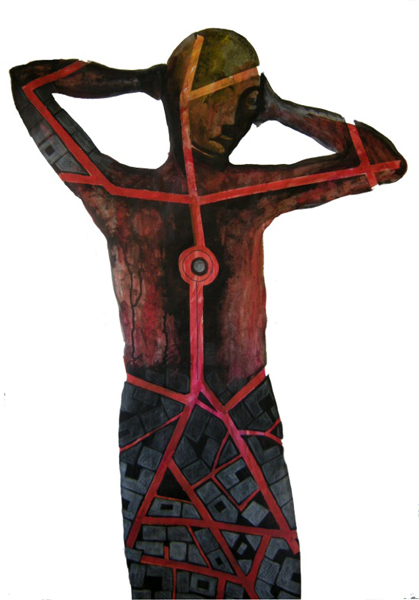The Cartographer’s Requiem
By Shira Lipkin
Illustration by Egle Ghe

Maps of the Soul by Egle Ghe
The train slices through the canyon, a ribbon of crimson, of carmine. That had been the cartographer’s signature color: thick lines of scarlet for rivers, delicate crosshatching of vermilion for mountain ranges. Her maps had been as beautiful as they were useful.
The singer had had the rare chance to watch the cartographer work, to watch her long fingers shift on the pen as she tilted its nib, widening a thread of ink to a thick, lush arc.
Like a murmuration of starlings, the singer had thought, the way they dip and swirl in the air.
She has been promised one of the cartographer’s maps for this service. One of her choosing. She does not know which to choose, which might hold her closest. The first she’d seen, of the forest beneath the mountain? The first she’d watched the cartographer create, of the castle in the sky?
The last of all, that map of the labyrinthine caves beneath the ocean, the one where the red is rusty and may not all be ink? The cartographer, by the end, was coughing blood — sometimes thick splashes of it onto the white of her handkerchiefs, sometimes a deeper maroon, oxidized. That’s what the ink on her final map looks like.
Interior, exposed.
The singer stands in the front car of the train, which has been painted for just this occasion; she presses a hand to the cold window. The landscape is getting sparser. It is almost time.
She has never done this before. It is a signal honor. Most singers who perform this task do so after years of service in the opera, after a long career. This is a thing that is earned, and the singer is keenly aware of the whispers. She is new, she is young; she is said to lack the necessary depth and gravitas. No one says it to her face, but they do say it: that she is not up to this, should not be entrusted with it, is not yet worthy.
That she was chosen simply because she was one of the cartographer’s lovers.
In her darker moments, the singer knows this for truth, and she carries that truth through her lighter moments as well, although she holds it with a delicate grasp. She is too young, too different, too untested. But the cartographer chose her. The cartographer chose her not simply for her voice, but for her intimate knowledge of the cartographer.
The singer remembers long nights awake with the insomniac cartographer, watching her pen dart across the page faster than thought, as if the landscape were coming through from someplace else and her lover only a conduit. She remembers bringing the cartographer tea and watching it cool. The trance of the work was almost total, some nights.
She remembers the nights near the end, when the pen slowed or skipped, when the cartographer bade her sing; when her voice was the only thing that could bring rest, or carry the cartographer through another hour of work.
(Her hair was long, was braided back near the end. Her eyes were fixed on the middle distance when she balanced the teacup in her free hand or cradled it to her chest for warmth. Her bones had a delicate grace, were traceable through her skin; the map of the cartographer herself, blue veins in place of scarlet rivers, the curves and hollows of her hips.)
(She faded, near the end. Her ink and the sharpness of her mind. Near the end, she’d had difficulty translating all of the landscape to the page. Lacunae proliferated on the map.
This task — the singing — required someone who had known her mind.)
The train slows, and the singer breathes deeply. In, then out. She adjusts her scarlet-fringed shawl as the train reaches the end of its track, as it comes to a halt so soft that it barely shakes her.
She opens the door and descends the wrought-iron spiral stairs at the head of the train. She must be on the ground for what’s to come.
The ground that, here, is near featureless. That stretches into the distance like blank vellum, vaguely yellow brown, shapes just a mere suggestion to the eye. Not many are allowed to the edges of the world, because not many can bear the sight of this nothingness. Even now, the other occupants of the train are clustered near the back, where they can be comforted by mountains and valleys.
She hears a stirring behind her and looks up. Sees the apprentice cartographer leaning on the railing. He is looking, not at the blank landscape, but at her. He is so young.
His color is green, she hears.
She turns; she shuts him out. She pulls out the cartographer’s true and ultimate map, the one she’d spent her life creating, from her apprenticeship through the final days of her life. There’s hesitancy there at the beginning; the singer can trace her lover’s life through the map as her lines become sure and steady, as she finds mastery.
She closes her eyes. She has, of course, memorized the map.
She begins to sing the cartographer’s requiem.
Her voice starts high, reedy, pulling a trickle of water from the ground to twist through the as-yet-unknown terrain, and her voice strengthens. It strengthens and it soars, her voice like the movement of the cartographer’s pen, her voice somehow red as blood and ink, and mountains push forth from the blankness before her. Saplings become trees become a forest. Paths twist ribbonlike into the unknown; the earth becomes red clay, the color of oxidized blood. The interior exposed, the paths like capillaries.
She opens her eyes, pulls strength from the ground below her; that power resonates in her voice as she sings the cartographer’s map into reality, sings the world, brings life to the world. Behind her a child scribbles in green on his vellum, trying to capture it all as it becomes, just as the cartographer did herself, once upon a time.
There is a drop of the cartographer’s blood in every map. That was her secret. And more than a drop in this one.
She sings the map and brings it forth, and brings forth all that the cartographer meant to put there, in those last, faltering days, all the passion and yearning and frustration and all of the sheer ridiculous beauty of the world. The map unfolds, the world unfolds, the world is made, and the singer feels the cartographer with her in those final, sweet, soft moments.
And her song drifts away, into the air of the world expanded, into the new.
 Unlikely Story
Unlikely Story



